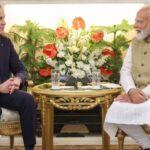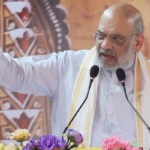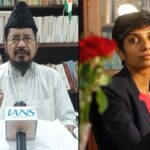Congress party leader Rahul Gandhi has recently accused the Election Commission of contributing to the creation of fake voters. At a press conference on Thursday, 7th August, he produced statistics from Karnataka’s Mahadevapura Assembly constituency in Bengaluru Central Lok Sabha constituency, saying that several voter entries in the voter list had “house number 0” and that numerous voters were listed at the same address. He called it a major conspiracy to steal elections in favour of the BJP.
However, it has now come to light that Rahul Gandhi’s constituency, Rae Bareli in Uttar Pradesh, also has the same kind of entries in its voter list. This is the seat that Rahul currently represents in Parliament, which his mother, Sonia Gandhi, held before him for multiple terms.
According to a report of Times Now Navbharat, the Rae Bareli Assembly constituency voter list under the Rae Bareli Lok Sabha seat has a huge number of “house number 0” voters, the very anomaly Rahul had pointed out in Karnataka.
Multiple voters at the same address
The report also shows that there are a number of instances where numerous voters are registered at the same location in Rae Bareli. For example, for one polling station, “House Number 8” has 27 voters registered. There are two other booths with “House Number 80” and “House Number 4”, each having 18 registered voters.
This is parallel to Rahul’s allegation in Mahadevapura, where he had accused 80 individuals of being registered at a single address. He had then held this up as evidence of extensive electoral cheating. The revelation of parallel trends in his constituency has raised questions: if Rahul is convinced that such entries are evidence of fraud elsewhere, then is the reverse also true in his election victory?
Why do ‘House number 0’ entries exist?
Election officials and analysts have observed that “house number 0” in the voters’ roll does not necessarily indicate voter fraud. In most villages, people have no records of their official house numbers, so they fill in a “0” as a placeholder in the voters’ list. This happens in both rural and urban India.
Also, several voters with the same address are not uncommon in India. Joint families, paying guests, or rental accommodations tend to result in lots of individuals being enrolled under a common address. The voter list is updated and edited regularly by the Election Commission to eliminate such stale entries.
The Mahadevapura case
Rahul’s strongest complaint was that a house in Mahadevapura had 80 duplicate voters enrolled. But when local Booth Level Officer (BLO) Muniratna was approached, he informed that there was no duplication.
This house, according to him, is mostly tenanted out, and the tenants keep changing every year. No family has resided there permanently for the last 14 years. Most individuals use their rental contract as an address to vote, but end up leaving the place. The BLO revealed that the list of individuals who are no longer staying at that location has already been submitted to the Election Commission, and names will be struck off.
The political twist
What makes the story politically charged is the irony: Rahul Gandhi has been strongly criticising the Election Commission and the BJP for voter list tampering, but the same trends are evident in his constituency.
In Bihar, the Election Commission is already conducting a Special Intensive Revision (SIR) exercise to purify the rolls of voters. Rahul has also attacked that process, but although invited by the EC to lodge written complaints, he has not yet lodged any formal evidence.
The scandal raises a fundamental question: are these “irregularities” evidence of intentional fraud, as Rahul asserts, or merely a function of administrative loopholes and India’s twisting voter registration system? For the present, the same problems Rahul highlighted in other seats appear to be present in Rae Bareli too, and that has triggered a new round of political debate.
Rahul Gandhi targets common man to amplify his ‘vote chori’ conspiracy theory
On Thursday (7th August), Rahul Gandhi conducted a press conference wherein he claimed that a man named Aditya Srivastava was voting in 3 different States simultaneously.
“He is Aditya Srivastava. His name is in the electoral rolls of Maharashtra, Karnataka (Bengaluru Urban) and Uttar Pradesh (Lucknow). His name appears 4 times. Same photo and same address,” the Congress leader alleged.
“And there are thousands of such people. 11,000 votes have been stolen like this,” he claimed. Rahul Gandhi defamed Aditya Srivastava by suggesting that the latter is somehow a part of a vote fraud scheme.
Election Commission debunks lies of Congress leader Rahul Gandhi
On Friday (8th August), the Election Commission of India (ECI) debunked the lies peddled by Congress leader Rahul Gandhi as part of his campaign to undermine the integrity of the nodal election body.
At the very onset, the Election Commission of India made it clear that the Supreme Court had turned down Congress’ petition for providing machine machine-readable voter list in 2019. As such, the nodal election body is under no compulsion to entertain this demand of the grand-old party.
It pointed out why CCTV footage is destroyed after 45 days and the rationale behind its preservation in specific case.
❌ The statements made are Misleading #ECIFactCheck
✅Read in detail in the image given👇 https://t.co/K1sKq1DvbU pic.twitter.com/tdqudyoXU2
— Election Commission of India (@ECISVEEP) August 8, 2025
The Election Commission of India stated, “Any aggrieved Candidate can file an election petition (EP) to challenge his election in the concerned High Court within 45 days. If an EP is filed, CCTV footage is retained; otherwise, it serves no purpose unless someone intends to breach voter privacy. For example, reviewing CCTV footage from 1 lakh polling stations would take 1 lakh days-that’s approximately 273 years-with no legal outcome.”
While responding to the claim of ‘committing mass fraud’, ECI pointed out how almost no appeals were made by the Congress party across 36 States and Union Territories, following the 2024 Lok Sabha election. This was despite the fact that the grand-old party had the legal sanction to challenge the nodal election body.
The Election Commission further stated, “Many such allegations are being made by Shri Rahul Gandhi and are being reported by the media, despite no written complaint ever being submitted by him. In the past as well, he has never personally sent a self-signed letter. For example, he raised the Maharashtra issue in December 2024. Subsequently, an advocate from AICC wrote to ECI. Our reply, dated 24 December 2024, is publicly available on ECI website. Yet, Shri Rahul Gandhi claims that ECI never responded.”
The nodal election body has therefore requested the Congress leader to submit his specific claims and objections against voters and sign the Declaration/Oath as per Rule 20(3)(b) of the Registration of Electors Rules, 1960.
“If Shri Rahul Gandhi does not sign the Declaration, it would mean that he does not believe in his analysis, resultant conclusions and is making absurd allegations. In which case, he should apologise to the nation,” it concluded.












